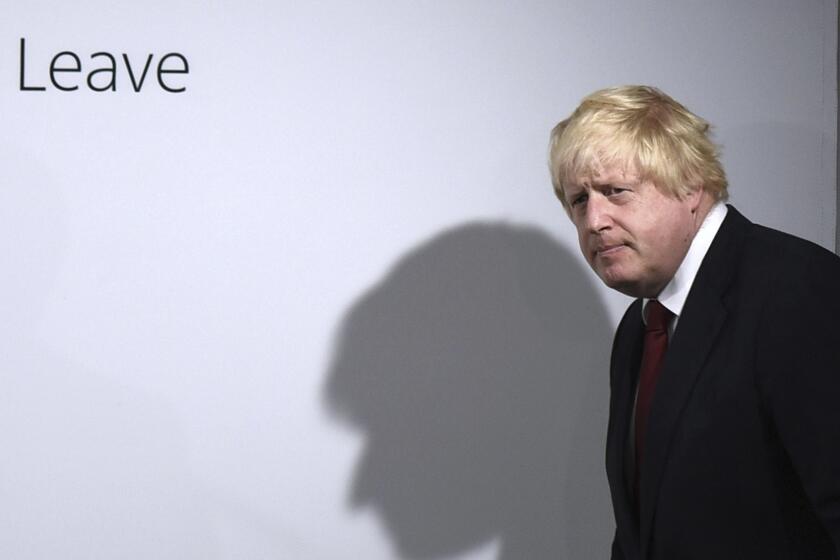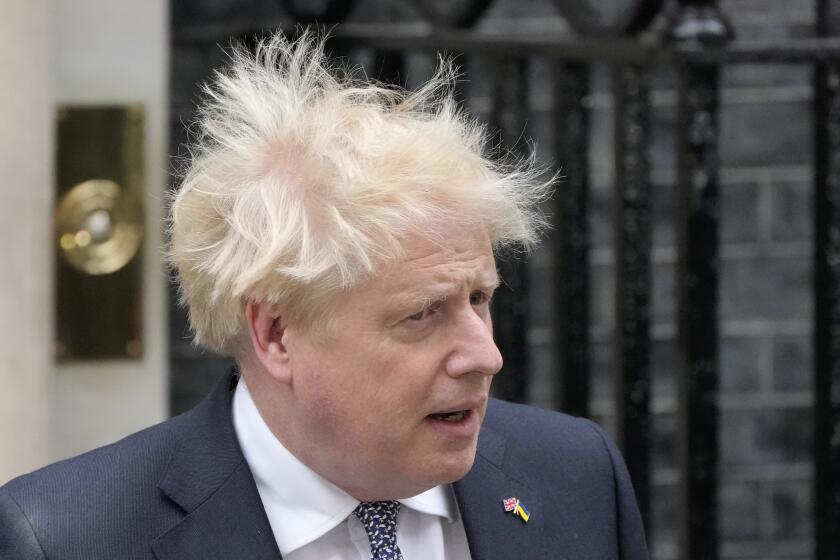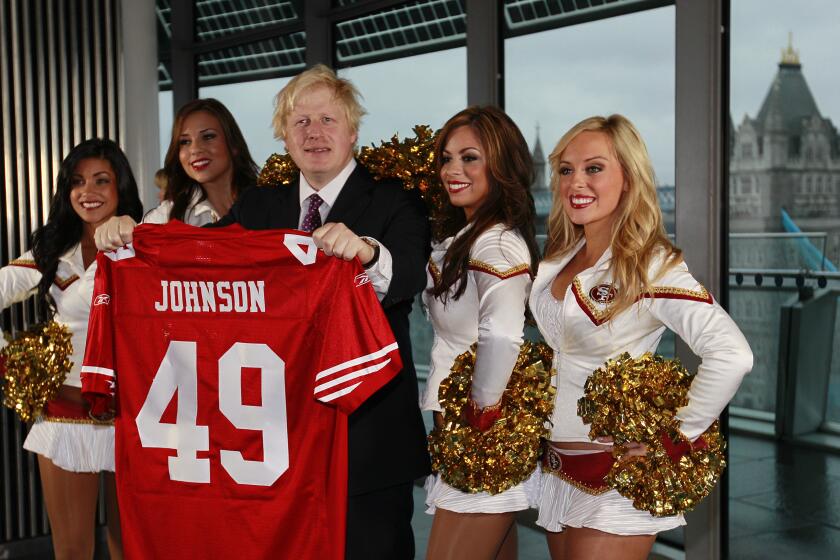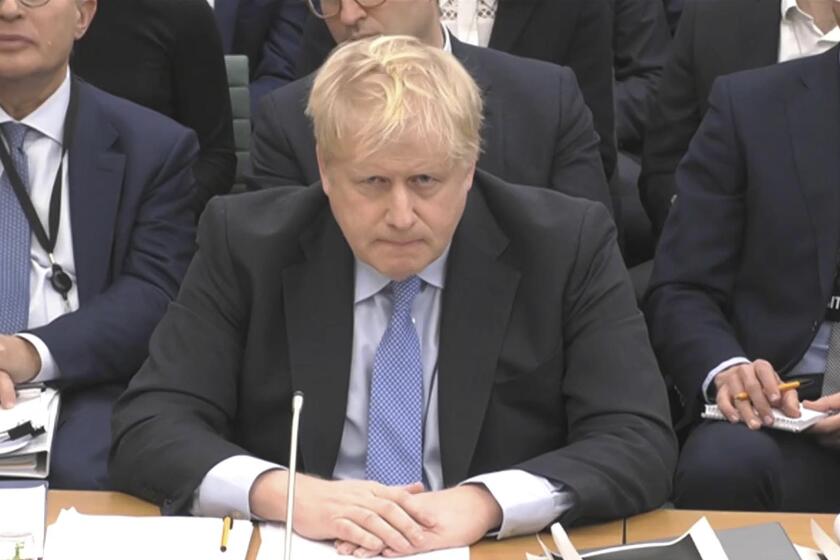Scathing report finds Boris Johnson deliberately misled U.K. Parliament over lockdown parties
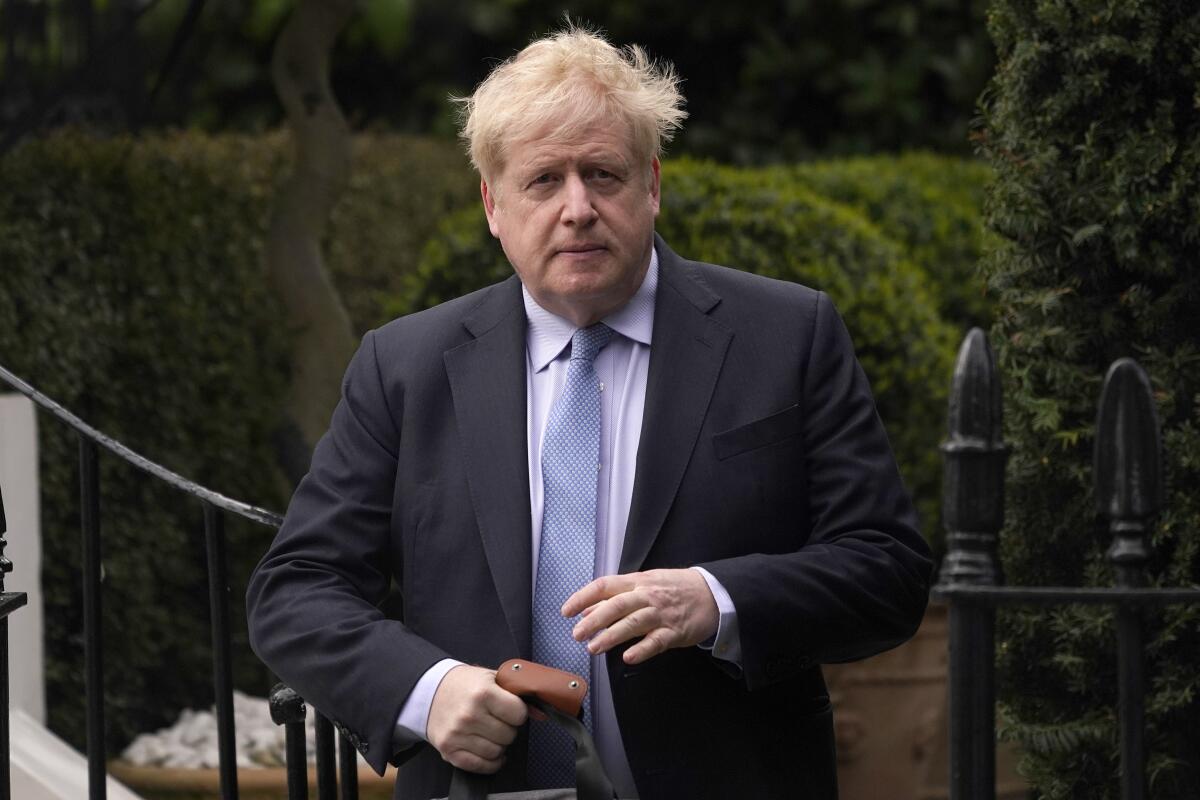
LONDON — A committee of lawmakers harshly rebuked former British Prime Minister Boris Johnson on Thursday, saying he lied to Parliament about lockdown-flouting parties and was complicit in a campaign to intimidate those investigating his conduct.
The House of Commons Privileges Committee found that Johnson’s actions were such a flagrant violation of the rules that they warranted a 90-day suspension from Parliament, where he still served after stepping down as prime minister last year. That sanction would have been more than enough to trigger a special election that could have cost Johnson his seat in the lower chamber, but he avoided that ignominy by resigning Friday after the committee gave him advance notice of its findings.
Release of the committee’s scathing 77-page report touched off an angry exchange of recriminations, with Johnson repeating his claims that the panel was a “kangaroo court” bent on ousting him from Parliament and the committee saying his defense was an after-the-fact justification that was “no more than an artifice.”
The report and reaction to it highlight the battle over Johnson’s legacy as Britain prepares for elections that could radically alter social and economic policy in a nation struggling to overcome a cost-of-living crisis and complaints about government services, including healthcare and law enforcement.
The Conservative Party, which has governed Britain since 2010, lags far behind the more liberal Labor Party in public opinion polls.
Prime Minister Rishi Sunak has desperately tried to shift attention away from Johnson since he took office in October, promising to cut inflation, control immigration and reduce government debt ahead of an election that must occur by December 2024.
Boris Johnson wanted to be like Winston Churchill, a charismatic leader who led Britain through a major crisis, but that dream has come crashing down.
But Johnson looms in the background, still revered by many Conservatives for winning an overwhelming victory in December 2019 and then delivering Britain’s exit from the European Union.
Attention will remain on Johnson for now because the full House of Commons must debate the committee’s report, providing another opportunity for the former prime minister’s backers and detractors to do battle. After the debate, lawmakers will vote on whether to uphold the panel’s findings and recommended sanctions.
British news outlets first revealed that members of Johnson’s staff held a series of parties in 2020 and 2021 when such gatherings were prohibited by pandemic restrictions. The “partygate” scandal angered the public, distracted lawmakers and was at the center of Thursday’s report.
Johnson initially denied that any parties took place, then repeatedly assured lawmakers that rules and guidance were followed at all times.
Boris Johnson’s resignation was the latest act in a career full of downfalls, comebacks and scandal. What comes next?
The committee, which took testimony from Johnson and senior members of his government during its 14-month investigation, concluded that those assurances were misleading and that Johnson failed to correct the record when asked to do so. This amounted to a “serious contempt” of Parliament, the panel found.
“The contempt was all the more serious because it was committed by the Prime Minister, the most senior member of the government,” the committee said. “There is no precedent for a Prime Minister having been found to have deliberately misled the House. He misled the House on an issue of the greatest importance to the House and to the public, and did so repeatedly.”
Johnson and his wife, Carrie, were fined by Scotland Yard last year for breaching COVID-19 laws at a birthday party for Johnson in June 2020 in his Downing Street residence and office. He was forced to step down as prime minister in September after dozens of ministers resigned from his government following a series of scandals, including partygate.
He has sought to salvage his political career by attacking the privileges committee and its members, saying their investigation was unfair and undemocratic. A majority of the panel’s seven members are fellow Conservatives.
Start your day right
Sign up for Essential California for the L.A. Times biggest news, features and recommendations in your inbox six days a week.
You may occasionally receive promotional content from the Los Angeles Times.
Johnson characterized the committee’s findings as “a load of complete tripe” and said the report was a “charade” designed to justify his opponents’ efforts to oust him.
“This is a dreadful day for MPs and for democracy,” Johnson said in a statement laced with fury. “This decision means that no MP is free from vendetta, or expulsion on trumped-up charges by a tiny minority who want to see him or her gone from the Commons.”
Had he not resigned, a suspension of 10 days or more would have allowed Johnson’s constituents to circulate a recall petition to oust him from the House of Commons. The committee found that Johnson’s misleading statements warranted a suspension long enough to trigger such a recall petition.
But it added that his efforts to impugn the committee’s reputation and undermine the democratic processes of the legislative chamber and his complicity in a public campaign to intimidate the committee amounted to further contempt of Parliament that warranted a suspension of 90 days.
Boris Johnson was the London mayor who hosted the Olympics, the leader who pledged to ‘get Brexit done’ and the premier brought down by ‘Partygate.’
Since Johnson had already resigned, the panel recommended not granting him the courtesy pass to parliamentary grounds traditionally given to former members.
If they are endorsed by the full House of Commons, the committee’s proposed sanctions would not bar Johnson from seeking office in the future. But his reaction to the findings, together with his attacks on fellow Conservatives, might make a political comeback impossible, said Steven Fielding, emeritus professor of politics at the University of Nottingham.
“He likes to kind of implicitly compare himself to Churchill, who had all kinds of disasters in his political career and yet came back in the most unlikely circumstances,″ Fielding said. “But I don’t think he’s a Churchill in that respect.”
Revelations of the booze-fueled gatherings angered many and added to a string of ethics scandals that spelled Johnson’s downfall. Johnson acknowledged misleading lawmakers when he assured them that no rules had been broken, but he insisted that he didn’t do so deliberately.
Former U.K. Prime Minister Boris Johnson has insisted “hand on heart” that he did not lie to lawmakers about government parties during the COVID-19 pandemic.
In March, he told the committee he “honestly believed” that the five gatherings he attended, including a send-off for a staff member and his own surprise birthday party, were “lawful work gatherings” intended to boost morale among overworked staff members coping with a deadly pandemic.
Sunak was Johnson’s treasury secretary during the pandemic and among dozens of people issued with fines for a series of office parties and “wine time Fridays” in 2020 and 2021 across government buildings.
The COVID-19 Bereaved Families for Justice U.K. group said the committee’s report was a painful reminder that, while the group’s members were saying goodbye to loved ones on Zoom, their country’s leader at the time was holding parties.
David Garfinkel, a spokesperson for the group, said Johnson should be barred from holding office again.
“Johnson has shown no remorse,’’ Garfinkel said in a statement. “Instead he lied to our faces when he told us that he’d done ‘all he could’ to protect our loved ones, he lied again when he said the rules hadn’t been broken [in the prime ministerial residence and office], and he’s lied ever since when he’s denied it again and again.”
More to Read
Sign up for Essential California
The most important California stories and recommendations in your inbox every morning.
You may occasionally receive promotional content from the Los Angeles Times.
